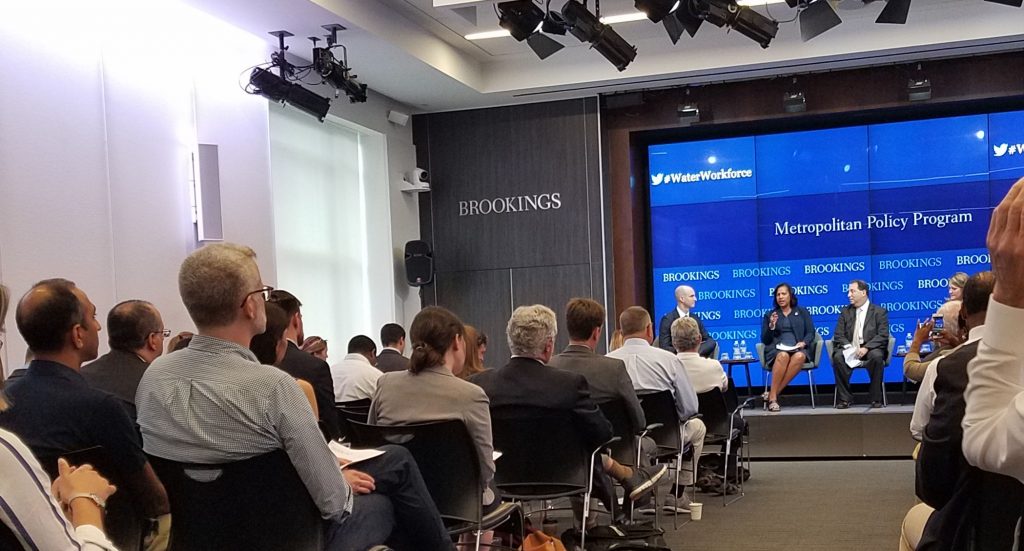
Rode down to Brookings for a program on the water workforce, see below. Getting my bike fixed and some of the parts replaced saves at least ten minutes of ride-time, as the energy formerly turned into friction heat and sideways wobbling gets converted to forward motion. It took me a little less than an hour and ten minutes to get all the way from my house to Brookings.
Program was worth the trip and was especially appropriate given my recent visit to the Milwaukee sewage plant.
Key points are that the labor force in the water industry, including sewage, drinking water and related functions like plumbers, is relatively old, 50+% are eligible to retire and it is hard to replace them with suitable workers.
One problem is the general labor shortage. With unemployment so low, it is just hard to find people. Making it worse, the work is semi-skilled, so people cannot just do it right out of the box. There is also a security aspect. Water is a sensitive industry. Workers must pass drug tests and it is sometimes hard for ex-cons to get a clearance, more on that below. It is also getting hard just to find guys who will show up on time every day.
The water industry jobs pay above average wages. The woman at the Milwaukee sewage plant told me that starting wages are $30-35 an hour. However, they still have trouble getting qualified help. It is often a dirty job, sometimes out in the elements in stinky places, and many people prefer to work in comfortable offices and complain about their low pay.
We heard from Louisiana Congressman Garret Graves. He said that we spend way too much money reacting to disasters and way too little anticipating and mitigating them. Hurricane Katrina, for example, was largely a man-made disaster. Nature provided the wind and water, but Louisiana and New Orleans were not properly prepared and that made it a disaster.
He talked about the need to build infrastructure – human and physical, grey and green – but not just dump money in an inefficient system. In Louisiana, for example, they were able to get jobs done for half or a third of the supposed cost by making contracts more open and specifications better.
Some of the best infrastructure is green. Coastal forests and mangroves are some of the best defense against storms and they filter the water between events.
Next came a panel including Kishia Powell, Commissioner, Department of Watershed Management – City of Atlanta, GA, Andrew Kricun, Executive Director and Chief Engineer – Camden County Municipal Utilities Authority (NJ) & Katie Spiker, Senior Federal Policy Analyst – National Skills Coalition.
Andrew Kricun talked about the paradox that unemployment in Camden is more than 10%, but he cannot get enough people to do the jobs in his water facilities. They are addressing that by outreach and training. They understand that much of the training will not directly benefit the water works, since people will find jobs elsewhere, but he talked of the triple bottom line – economy, environment and social good.
Kisa Powell agreed and went on that in Atlanta they were trying to hold onto some of their older workers longer and going to non-traditional places to find new ones. For example, they have a program with the local prisons to train convicts while still in the joint for jobs they may take when they get out. This is another instance of a social benefit.Ex-cons can have trouble finding work and can too easily slip back into the ways that got them in jail in the first place. A steady and demanding job can help keep them on the straight and narrow.
They all emphasized that it is better to anticipate and avoid than to react to crisis. Emergency repairs can cost 3-5 times as much as fixing it in time.
They also touted the benefits of preparation and green infrastructure. Rain gardens, for example, can avoid overflows at the sewage plants. The water still finds its way back into the rivers, but slowly and usefully.
Everybody talked about the problem of just finding out what is going on. There are lots of good ideas, but they need more connectors. I have thought about this a lot myself. Connectors are very important, but they get no respect. Everybody thinks they are just talking to people and traveling and too many think that either communication happens by itself or that there can be some kind of centralized system that does it all.
